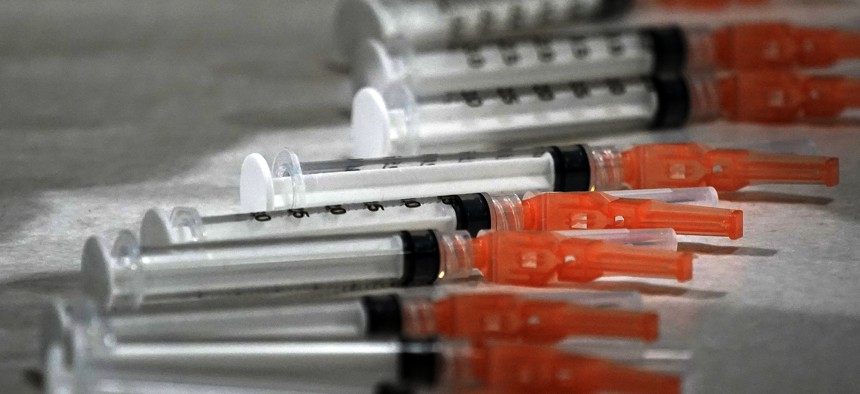States Reallocating Covid Vaccines from Federal Nursing Home Program

These are syringes loaded with the Moderna COVID-19 Vaccine, during a vaccination clinic hosted by the University of Pittsburgh and the Allegheny County Health Department at the Petersen Events Center, in Pittsburgh, Thursday, Jan. 28, 2021. AP Photo/Gene J. Puskar
Health officials from five states told members of a House panel on Tuesday that flexibility allocating doses has been helpful, but that vaccine deliveries are still falling short of demand.
Covid-19 vaccines were going unused in Louisiana because a federal program that set aside doses for nursing homes was distributing them much faster than they could be administered, according to the head of the state’s health department.
It’s an example of why states needed flexibility to reallocate doses that were not used through the Pharmacy Partnership for Long-Term Care Program, said Dr. Courtney Phillips, the secretary of the Louisiana Department of Health, during a congressional hearing Tuesday. Changes to the federal program have since allowed states to claw back unused doses, giving Louisiana the ability to distribute the vaccine to other high-priority groups, she said.
“Doing so has allowed us to push more in the community and not have that vaccine sitting there,” Phillips told the House Committee on Energy and Commerce..
Nearly 93,000 of 438,000 vaccine doses Louisiana received as of Jan. 30 were set aside for the Pharmacy Partnership for Long-Term Care Program, she said.
“The greatest assistance you can provide around this program is to provide continued flexibility and visibility to states when it comes to doses allocated to the LTC partnership,” Phillips added.
The committee heard from public health officials from five states about the status of coronavirus vaccine distribution and the challenges they’ve faced.
Officials from several states cited issues with the long-term care program, a partnership with national pharmacy chains CVS and Walgreens, created by the Trump administration to coordinate vaccine distribution to nursing homes. Every state but West Virginia joined the long-term care vaccination program, and several have sought to revise allocations to address mismatches in supply.
Michigan found that the federal program had overestimated the number of residents in each long-term care facility, leading to more doses being set aside than were necessary, said Dr. Joneigh Khaldun, the chief medical executive for the state’s Department of Health and Human Services.
She said in written testimony that Michigan worked with the U.S. Centers for Disease Control and Prevention to reallocate those doses statewide without affecting the state’s ability to deliver vaccines to long-term care facility residents.
Instead of relying on the federal partnership, West Virginia, lauded for its high rate of vaccinations, worked instead with local pharmacies. More people per capita have received vaccines in West Virginia than any other state and 85% of distributed doses have been used.
“In order to best meet the needs of our citizens, we needed to have local involvement,” said Dr. Clay Marsh, West Virginia’s coronavirus czar.
The state tracks doses of the vaccine using GPS technology and any vaccines that are not used within seven days of distribution are collected and brought back to a central hub for reallocation, he said.
President Biden announced last week that the federal government would increase the number of vaccine doses that states receive by 16% and provide three-week estimates detailing the number of doses in the pipeline and headed to states.
Jill Hunsaker Ryan, the executive director of Colorado’s Department of Public Health and Environment, told the committee that federal transparency has improved. But the state is still receiving far fewer doses than it has the capacity to administer.
“We are getting about 80,000 doses a week. We have the capacity for 300,000 doses now and are ramping up for 400,000 doses a week,” Ryan said. “So we need supply.”
Andrea Noble is a staff correspondent with Route Fifty.
NEXT STORY: Are Conservative Policies Shortening American Lives?





